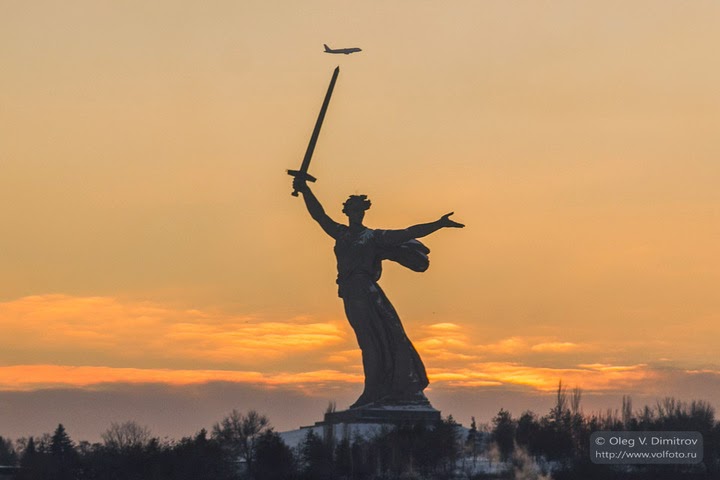One of Russia’s biggest holidays is a WWII anniversary Americans don’t think about
By Michael Birnbaum May 7 at 6:00 AM
MOSCOW — To most Americans, the anniversary of the defeat of Nazi Germany slips by unnoticed. To Pavel Elfimov, it’s among the biggest holidays of the year.
Ask any Russian abouttheir family’s World War II experiences, and the answer, almost invariably, is one of suffering and battlefield service. Unlike the United States, which had two oceans that largely insulated it from attack after Pearl Harbor, Russia was besieged, bombed, invaded and reinvaded during World War II. Then the Red Army swept toward Berlin and played a key role in toppling Adolf Hitler.
“You have Thanksgiving. We have Victory Day,” said Elfimov, 44, who came with his family this week to a nighttime rehearsal for Moscow’s annual Victory Day Parade. The procession is a bristling display of military might that sweeps down some of the capital’s most exclusive streets before rolling through Red Square in front of the Kremlin elite.
Russian President Vladimir Putin revived the Soviet-style tank parade in 2008, seeing the day as away to rally citizens around the flag. But despite the hundreds of missile launchers, warplanes and anti-aircraft guns that roll through Red Square every year, many Russians say that the true meaning of the holiday is more personal, 71 years after the end of the war.
“In Russia there are very few families who weren’t touched by it,” said Elfimov, who added that both of his grandfathers fought in the war and that one of them died shortly afterward, his resilience destroyed by combat.
Of more than two dozen people approached at the rehearsal, all had a parent, grandparent or great-grandparent who fought in the war. Most said at least one direct ancestor died in the fighting. Soviet losses were immense — most historians estimate the Soviet death toll between 27 million and 28 million people — and the oldest generation of Russians still has aching memories of wartime starvation.
“It was impossible,” said Irina Kravchenko, 60, who said that 300 of the 500 people living in her small town in the Ural Mountains at the time of the war headed off to combat. Her grandfather never came home from the fighting, she said, a memory she wanted to make sure she passed down to her grandchild, who along with her daughter-in-law was watching soldiers on anti-aircraft missile systems prepare for the parade.
“The memory of service was so tough. There was an inner strength,” Kravchenko said about the townspeople who returned from war. “They didn’t like to talk about their experiences.”
World War II tends to be remembered in the United States as a victory by Americans, with the Red Army acting more or less as an adjunct. Russian memories are focused on their own sacrifices. As the veterans have died, their children and grandchildren have started to march on Victory Day, holding their photos, separately from the martial parades. That started as a nonpolitical movement in 2012, and has since been embraced by the Kremlin.
Critics of Putin’s Victory Day celebrations say that he has turned the anniversary into a politicized event that serves the state more than the memories of the people who suffered in the war. Veterans once gathered to drink on the holiday and remember fallen comrades. Now the main focus is on the military parades, which this year will feature advanced warplanes streaking over the Kremlin as intercontinental ballistic missiles plod through Red Square. Fascism, too, has taken on new meanings, with the term routinely lobbed by the Kremlin at Ukraine’s new leaders. Commemorating the World War II victory burnishes Putin’s efforts to garner domestic support for tough policies toward his neighbor.
And few history textbooks take a critical view of Stalin’s performance during the conflict, known here as the Great Patriotic War. Largely forgotten is the 1939 Molotov-Ribbentrop Pact between the Soviet Union and Nazi Germany that allied Joseph Stalin with Hitler before Germany launched a surprise attack in 1941. The suffering Stalin inflicted on his own people, along with the pain the Red Army inflicted on Eastern Europe as it fought its way toward Berlin, goes unmentioned.
But some people who turned to Moscow’s streets to honor their ancestors sought to distance the martial parade from any modern military meaning.
“It’s two separate stories,” said Nadezhda Sklyar, 27, whose 4-year-old son, Sebastian, was asking soldiers questions about their military equipment as he waited for them to start their rehearsal. “My grandfather served. He was gravely wounded in Leningrad. My other grandfather was a Belarusan partisan,” she said.
“I grew up with this,” she said. “I hope my son has these memories, too.”
“To him, it’s interesting, these tanks,” Sklyar said of her son. “Thank God they’re not used now. I’m worried about war,” she said. However, any conflict between Russia and the West would be nuclear, so the hardware in the parade would be of little relevance, she said.
Many soldiers who are on active duty look back at their families’ war histories as inspiration.
“Everyone in my family has served,” said Ivan Medvedev, 23, an enlisted soldier in an airborne battalion who was drinking a cup of coffee with his fiancée while waiting for the parade rehearsal to start.
Medvedev’s great-grandfather served in the Soviet navy, he said. His great-grandmother was a nurse. His father fought in Afghanistan, and his brother was in Chechnya. Medvedev said that he was posted in Moscow for now — and with his wedding coming up, he didn’t seem eager to leave.
Medvedev said he was happy to be able to mark the anniversary on behalf of the members of his family who had fought in war, but he was mindful that World War II was sometimes about sacrifice more than glory.
“My great-grandfather served in the fleet,” Medvedev said. “It was really hard for him to talk about it.”

